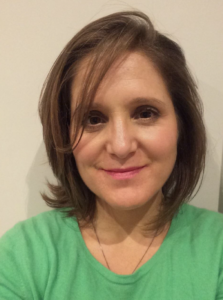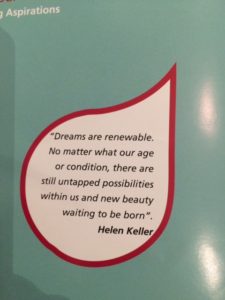 Thea Fitch is a peer recovery trainer and peer support worker in a community health team for homeless individuals, who are admitted to psychiatric wards. She uses her personal experiences with mental health difficulties, hospital admissions, and homelessness to help people get their lives back on track.
Thea Fitch is a peer recovery trainer and peer support worker in a community health team for homeless individuals, who are admitted to psychiatric wards. She uses her personal experiences with mental health difficulties, hospital admissions, and homelessness to help people get their lives back on track.
Thea started using the Rix Wiki in November 2015. “I was so excited,” she says. Before the Wiki version of the Health and Wellbeing plan, Thea was using the paper version. “I got my paper version when I was a student here at the Recovery College and I had it for many years. I was on my second version, which I’d been using for four years and it was like my Bible but it was really difficult to add or change things.”
Thea also found it hard to keep parts of her plan private. “My dad helped me put my plan together and was very respectful, but I couldn’t help but feel a bit guilty when I had to cover certain parts with my hand.” Thea’s paper Healthcare plan was a folder stuffed with pamphlets and pieces of notebook paper and she could do only so much to protect a stack of paper covered in writing.
When Thea began using the Rix Wiki she saw how easy it was to add to, and edit her plan. “It was so amazing! I am not good with technology but the Wiki is quite easy to use,” she says. The privacy and the security of the Wiki online makes it easy for Thea to share sections of her Wiki with professionals and friends – and her Dad – without having to feel embarrassed about not wanting to share other sections. “It’s like my own little scrapbook,” Thea explains, “except now I can change it without having to rip out pages.”
 Thea finds great inspiration in certain quotes and now, instead of jotting a new quote down on the back of a piece of paper and stuffing it in a folder, Thea can add the image or type up the quote onto her Wiki and it is immediately uploaded and saved alongside her collection of inspirational words.
Thea finds great inspiration in certain quotes and now, instead of jotting a new quote down on the back of a piece of paper and stuffing it in a folder, Thea can add the image or type up the quote onto her Wiki and it is immediately uploaded and saved alongside her collection of inspirational words.
But a Wiki is more than just a scrapbook, it’s a representation of an individual’s wants, needs and aspirations. It is their voice when they are unable to speak up for themselves. It is a reminder to doctors and professionals that this patient is a person. “Having a Wiki allows me to communicate my person and character in a way that is meaningful to me. It helps others to understand how I like to be treated when I am unable to verbalise it for myself,” Thea explains.
A Wiki is also a reminder to the individual themselves that they can do it. It is a guideline that helps them to take care of their psychological and physical wellbeing. For Thea, the Wiki is an important tool. “My Health and Wellbeing plan has helped me to figure out how to live with all of these things and now I am working at a job that I love. I feel quite proud of my Wiki. It’s not a self-indulgent thing but a compassion act towards myself.”
To view case studies about other users of the Rix Wiki, please click here.
